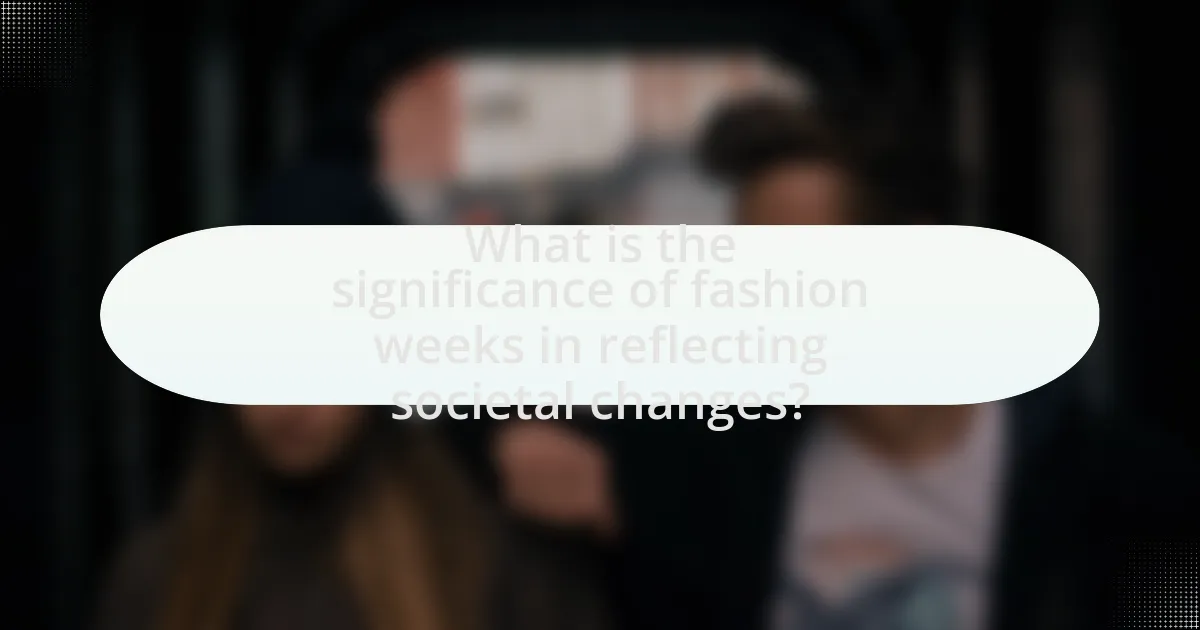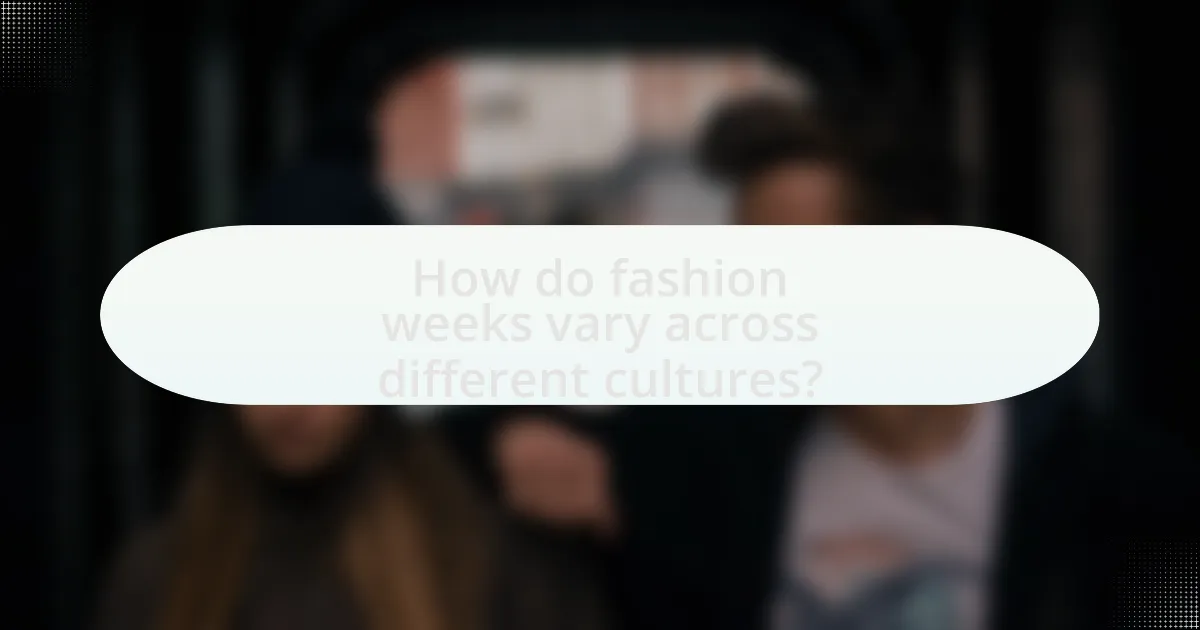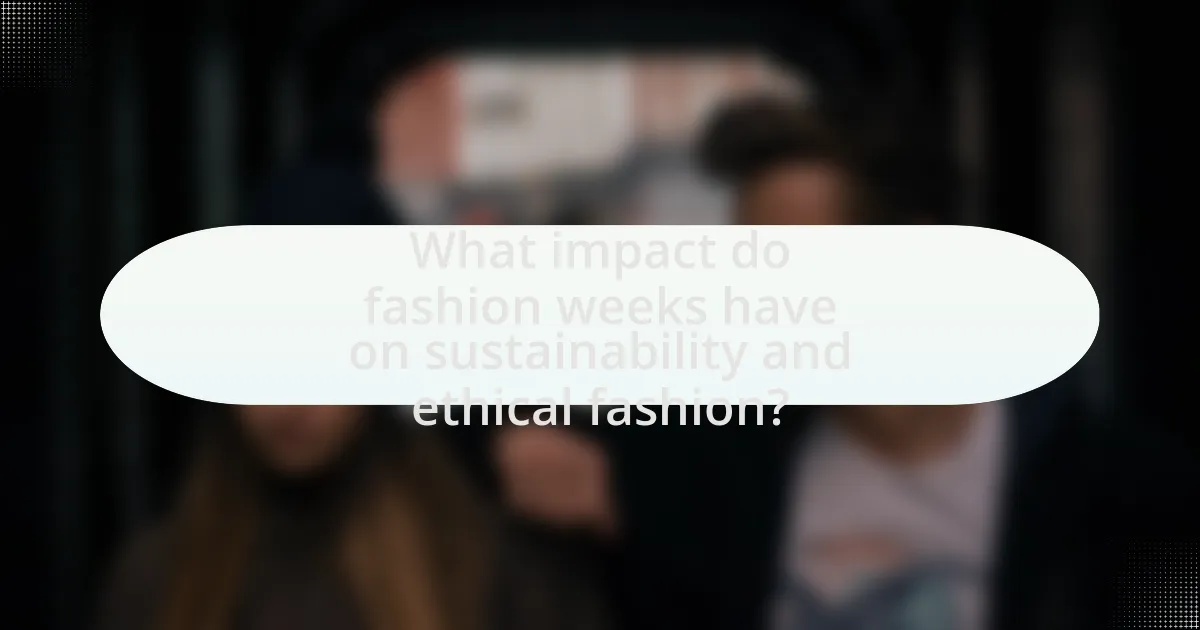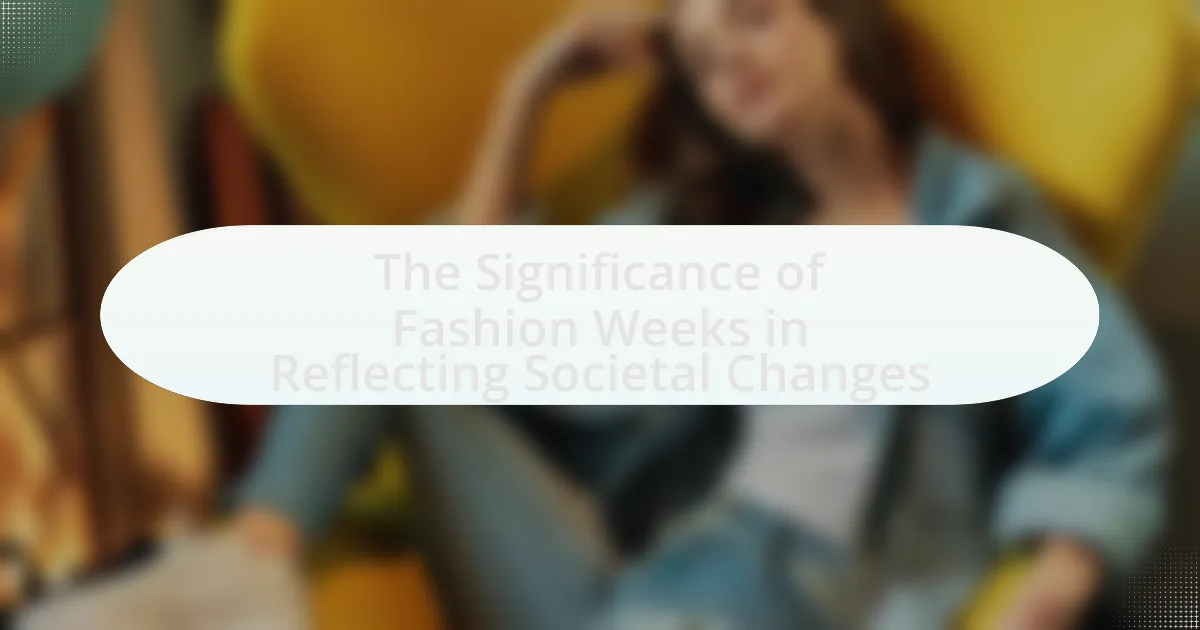Fashion weeks play a crucial role in reflecting societal changes by serving as a barometer for cultural shifts, social movements, and evolving consumer values. They highlight significant trends such as inclusivity, diversity, and sustainability, showcasing a growing acceptance of various body types, gender identities, and eco-friendly practices. Designers increasingly incorporate social issues into their collections, using fashion as a platform for dialogue and awareness. The article explores how fashion weeks influence trends, consumer behavior, and the careers of emerging designers while addressing the unique societal issues presented in different cultural contexts. Additionally, it examines the future of fashion weeks in relation to technology and social media, emphasizing the importance of aligning collections with contemporary societal values.

What is the significance of fashion weeks in reflecting societal changes?
Fashion weeks are significant in reflecting societal changes as they serve as a barometer for cultural shifts, social movements, and evolving consumer values. For instance, the inclusion of diverse models and sustainable practices in recent fashion weeks highlights the growing societal emphasis on inclusivity and environmental consciousness. Historical data shows that during the 1960s, fashion weeks began to mirror the counterculture movement, showcasing styles that challenged traditional norms. This trend continues today, with fashion weeks increasingly addressing issues such as gender identity and body positivity, thereby influencing public discourse and consumer behavior.
How do fashion weeks serve as a mirror to cultural shifts?
Fashion weeks serve as a mirror to cultural shifts by showcasing the evolving values, aesthetics, and social issues of society. Designers often draw inspiration from current events, movements, and cultural dialogues, reflecting changes in consumer attitudes and societal norms. For instance, the rise of sustainability in fashion has been prominently featured in recent fashion weeks, highlighting a collective shift towards environmental consciousness. Additionally, the inclusion of diverse models and representation of various body types during these events signal a growing acceptance of inclusivity and body positivity in contemporary culture. This alignment between fashion presentations and societal changes illustrates how fashion weeks not only respond to but also influence cultural narratives.
What specific societal changes are often highlighted during fashion weeks?
Fashion weeks often highlight societal changes such as increased diversity and inclusivity in the fashion industry. This shift is evidenced by the growing representation of models of various ethnicities, body types, and gender identities on runways, reflecting broader societal movements advocating for equality and representation. For instance, the 2020 New York Fashion Week showcased a record number of plus-size models, indicating a significant change in industry standards and consumer expectations. Additionally, fashion weeks increasingly address sustainability and ethical practices, with many designers incorporating eco-friendly materials and promoting fair labor practices, aligning with the global push for environmental responsibility and social justice.
How do designers incorporate social issues into their collections?
Designers incorporate social issues into their collections by using fashion as a platform to raise awareness and provoke dialogue. For instance, many designers have addressed topics such as climate change, gender equality, and racial justice through their designs, often featuring slogans, imagery, or materials that reflect these themes. A notable example is the 2018 New York Fashion Week, where several designers showcased collections that highlighted the #MeToo movement, integrating messages of empowerment and resistance into their garments. This approach not only engages consumers but also aligns with a growing trend in the fashion industry to reflect societal values and advocate for change.
Why are fashion weeks important for the fashion industry?
Fashion weeks are crucial for the fashion industry as they serve as a platform for designers to showcase their latest collections, influencing trends and consumer behavior. These events allow brands to present their creative visions to buyers, media, and the public, thereby shaping the direction of fashion for upcoming seasons. Historically, fashion weeks have been instrumental in establishing the prominence of cities like Paris, Milan, New York, and London as global fashion capitals, with events like New York Fashion Week attracting over 200,000 attendees and generating significant economic impact. Additionally, fashion weeks reflect societal changes by highlighting cultural movements and promoting diversity, sustainability, and innovation within the industry.
How do fashion weeks influence trends and consumer behavior?
Fashion weeks significantly influence trends and consumer behavior by showcasing new designs and setting the tone for upcoming seasons. Designers present their collections to industry insiders, media, and influencers, which creates immediate buzz and shapes public perception. For example, the Spring/Summer 2022 New York Fashion Week highlighted sustainability, leading to a 30% increase in consumer interest in eco-friendly fashion brands, as reported by the Fashion Institute of Technology. This demonstrates how fashion weeks not only dictate aesthetic trends but also drive consumer purchasing decisions, aligning them with the showcased styles and values.
What role do fashion weeks play in the careers of emerging designers?
Fashion weeks serve as critical platforms for emerging designers to showcase their collections, gain visibility, and connect with industry influencers. These events provide designers with opportunities to present their work to a global audience, including buyers, media, and potential collaborators, which can lead to increased sales and brand recognition. For instance, participation in prestigious fashion weeks like New York or Paris can significantly elevate a designer’s profile, as evidenced by the rise of brands such as Proenza Schouler and Rodarte, which gained prominence after their early showcases. Additionally, fashion weeks often attract significant media coverage, further amplifying the reach of emerging designers and facilitating networking opportunities that can be pivotal for career advancement.

How do fashion weeks vary across different cultures?
Fashion weeks vary across different cultures in terms of themes, presentation styles, and cultural influences. For instance, Paris Fashion Week emphasizes haute couture and luxury, showcasing established designers and innovative trends, while Tokyo Fashion Week often highlights street fashion and avant-garde styles, reflecting Japan’s unique subcultures. Additionally, New York Fashion Week focuses on commercial viability and diversity, featuring a wide range of designers from various backgrounds. These cultural differences are evident in the types of garments presented, the audience engagement, and the overall atmosphere, which collectively illustrate how fashion weeks serve as a mirror to societal values and changes within each culture.
What are the key differences between major fashion weeks worldwide?
Major fashion weeks worldwide differ primarily in their cultural influences, scheduling, and target audiences. For instance, New York Fashion Week emphasizes commercial viability and accessibility, showcasing ready-to-wear collections that appeal to a broad consumer base. In contrast, Paris Fashion Week is renowned for its haute couture presentations, focusing on artistic expression and luxury, attracting elite clientele and fashion insiders. Milan Fashion Week is characterized by its strong emphasis on craftsmanship and Italian heritage, often featuring established luxury brands. London Fashion Week, known for its avant-garde and innovative designers, often challenges traditional fashion norms and promotes emerging talent. These differences reflect the unique societal values and market dynamics of each city, influencing global fashion trends and consumer behavior.
How do cultural contexts shape the themes presented at fashion weeks?
Cultural contexts significantly shape the themes presented at fashion weeks by influencing designers’ inspirations, aesthetics, and narratives. For instance, during the 2020 Paris Fashion Week, many designers incorporated elements reflecting social movements, such as sustainability and diversity, which were prevalent in global discourse. This alignment with cultural contexts not only resonates with audiences but also serves as a commentary on contemporary societal issues, demonstrating how fashion can mirror and respond to cultural shifts.
What unique societal issues are addressed in regional fashion weeks?
Regional fashion weeks address unique societal issues such as cultural identity, sustainability, and economic development. These events often showcase local artisans and traditional craftsmanship, highlighting the importance of preserving cultural heritage in the face of globalization. For instance, fashion weeks in Africa frequently emphasize the use of indigenous materials and techniques, promoting local economies and empowering communities. Additionally, many regional fashion weeks are increasingly focusing on sustainable practices, addressing environmental concerns by advocating for eco-friendly materials and ethical production methods. This shift reflects a growing awareness of the fashion industry’s impact on climate change and resource depletion. By tackling these issues, regional fashion weeks serve as platforms for dialogue and change, influencing both local and global fashion narratives.
How do fashion weeks adapt to changing societal norms?
Fashion weeks adapt to changing societal norms by incorporating diverse models, sustainable practices, and inclusive designs. For instance, many fashion weeks have begun to feature models of various ethnicities, body types, and gender identities, reflecting a broader societal push for representation and inclusivity. Additionally, the rise of sustainability in fashion has led events to prioritize eco-friendly materials and ethical production methods, aligning with growing consumer demand for responsible fashion. The shift towards digital presentations during the COVID-19 pandemic also illustrates how fashion weeks can quickly pivot to meet societal needs, making shows more accessible to a global audience. These adaptations demonstrate the industry’s responsiveness to evolving cultural values and consumer expectations.
What trends have emerged in response to social movements during fashion weeks?
Trends that have emerged in response to social movements during fashion weeks include increased representation of diverse body types, gender identities, and cultural backgrounds on the runway. For instance, the rise of body positivity has led to brands like Savage X Fenty showcasing models of various sizes, reflecting a broader societal push for inclusivity. Additionally, the Black Lives Matter movement has prompted designers to prioritize racial diversity, as seen in the 2020 New York Fashion Week, where a significant number of Black models were featured. These trends illustrate how fashion weeks are adapting to and reflecting contemporary social issues, aligning with the values of inclusivity and representation that are increasingly demanded by consumers.
How have inclusivity and diversity been integrated into fashion week presentations?
Inclusivity and diversity have been integrated into fashion week presentations through the representation of models of various ethnicities, body types, and gender identities. Major fashion weeks, such as New York and London, have increasingly featured diverse casting, with brands like Savage X Fenty showcasing models of all sizes and backgrounds, reflecting a broader societal push for representation. According to a 2021 report by the Council of Fashion Designers of America, 40% of models on runways were from diverse backgrounds, indicating a significant shift towards inclusivity in the industry.

What impact do fashion weeks have on sustainability and ethical fashion?
Fashion weeks significantly influence sustainability and ethical fashion by showcasing eco-friendly designs and promoting responsible practices within the industry. Major fashion events increasingly feature brands that prioritize sustainable materials, ethical labor practices, and reduced environmental impact, reflecting a growing consumer demand for transparency and accountability. For instance, the 2021 Copenhagen Fashion Week implemented a sustainability action plan requiring participating brands to meet specific environmental criteria, demonstrating a commitment to sustainable fashion. This shift not only raises awareness among consumers but also encourages designers to adopt more sustainable practices, ultimately driving the industry toward a more ethical future.
How are sustainability issues represented in fashion week collections?
Sustainability issues are represented in fashion week collections through the use of eco-friendly materials, ethical production practices, and themes that promote environmental awareness. Designers increasingly showcase garments made from organic cotton, recycled fabrics, and biodegradable materials, reflecting a shift towards sustainable sourcing. For instance, brands like Stella McCartney and Eileen Fisher have consistently highlighted their commitment to sustainability by incorporating innovative materials and transparent supply chains in their collections. Additionally, many fashion weeks now feature dedicated segments or awards for sustainable fashion, emphasizing the industry’s growing recognition of environmental impact. This trend aligns with consumer demand for responsible fashion, as evidenced by a 2021 McKinsey report indicating that 67% of consumers consider sustainability when making a purchase.
What initiatives have been launched during fashion weeks to promote ethical practices?
During fashion weeks, initiatives such as the Fashion Pact and the Green Carpet Challenge have been launched to promote ethical practices. The Fashion Pact, initiated in 2019, is a global coalition of fashion and textile companies committed to environmental goals, including reducing greenhouse gas emissions and protecting biodiversity. The Green Carpet Challenge, established by Livia Firth, encourages designers to use sustainable materials and ethical production methods, showcasing collections that prioritize social responsibility. These initiatives reflect a growing awareness within the fashion industry about the need for sustainable practices and ethical considerations in response to societal demands for transparency and accountability.
What are the future trends for fashion weeks in relation to societal changes?
Future trends for fashion weeks will increasingly emphasize sustainability and inclusivity in response to societal changes. As consumers become more environmentally conscious, fashion weeks are likely to showcase eco-friendly materials and ethical production practices, reflecting a shift towards sustainable fashion. Additionally, the demand for diversity and representation will drive fashion weeks to feature a broader range of models and designers from various backgrounds, aligning with societal movements advocating for equality and inclusivity. This trend is supported by the rise of initiatives like the Fashion Pact, which aims to unite the fashion industry in addressing climate change, and the increasing visibility of diverse voices in fashion, as seen in recent collections that prioritize representation.
How might technology influence the evolution of fashion weeks?
Technology will significantly influence the evolution of fashion weeks by enabling virtual and augmented reality experiences, enhancing accessibility and engagement. For instance, brands like Balenciaga and Gucci have utilized digital platforms to showcase their collections through immersive online experiences, allowing global audiences to participate in real-time. Additionally, the rise of social media has transformed how fashion weeks are marketed and consumed, with platforms like Instagram and TikTok allowing instant sharing and interaction, thus broadening the reach and impact of fashion events. According to a report by McKinsey & Company, the integration of technology in fashion shows can lead to increased viewer engagement by up to 70%, demonstrating its potential to reshape traditional formats and enhance audience connection.
What role will social media play in shaping future fashion weeks?
Social media will play a pivotal role in shaping future fashion weeks by enhancing accessibility and engagement for a global audience. As platforms like Instagram and TikTok allow designers to showcase their collections in real-time, they democratize fashion, enabling wider participation beyond traditional industry insiders. For instance, the 2021 New York Fashion Week saw a significant increase in digital viewership, with over 1.5 million viewers engaging through social media channels, illustrating the shift towards online platforms. This trend not only amplifies brand visibility but also fosters direct interaction between designers and consumers, influencing trends and consumer preferences more rapidly than ever before.
What practical tips can designers follow to align their collections with societal changes?
Designers can align their collections with societal changes by actively researching current social issues and trends, ensuring their designs reflect contemporary values and concerns. For instance, incorporating sustainable materials and ethical production practices addresses the growing consumer demand for environmentally friendly fashion, as evidenced by a 2021 McKinsey report indicating that 67% of consumers consider sustainability when making a purchase. Additionally, engaging with diverse communities and representing various cultural narratives in collections fosters inclusivity, which is increasingly important in today’s society. By attending fashion weeks and observing the themes presented, designers can gain insights into the evolving societal landscape, allowing them to create relevant and impactful collections.

Leave a Reply